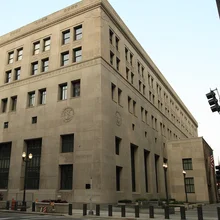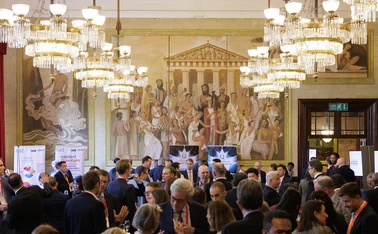
Financial inclusion initiative: Federal Reserve Bank of St Louis
Improvements in bank’s financial inclusion initiatives are helping tackle polarisation of economic education

One of the root causes of the great recession lay in the level of financial education among the general public, who struggled to make economically sound and well-informed financial decisions as a result. This contributed to ill-advised borrowing from reckless lenders, with these loans ultimately being repackaged and leveraged by financial intermediaries in a manner that caused disastrous problems for the global economy.
“While there are many causes to the economic problems facing the country, it is undeniable that a lack of financial literacy is a contributing factor,” Charles Schwab, the former president of the US Advisory Council on Financial Literacy, declared in January 2009.
Mary Suiter, assistant vice-president and economic educator officer at the Federal Reserve Bank of St Louis, agrees: “If people better understand economics and the economy in which they live, they are able to make better decisions at a personal level, but also as a voter and a citizen. And when we make better decisions, those aggregate to make a stronger economy.”
But there is often a polarisation in the quality of teaching in economics. Many under-resourced schools produce students with sub-par financial knowledge, meaning they are ill-equipped to make sound economic decisions.
In the past year, the St Louis Fed took significant steps to tackle this issue. Its economic education team, headed by Suiter, developed free resources and teacher engagement programmes to enable more effective and inclusive education of economics for students.
From September 2017 to August 2018, its teaching resource website had 1.1 million new student enrolments and 1.2 million resource downloads, a 38% increase from the previous year. The St Louis Fed reached more than 460,000 students via its face-to-face programmes, and within the reserve bank’s district it has reached 85% of lower-income schools.
The programme’s impressive reach is testament to the teams working to introduce new initiatives and improve existing ones. Over the last year, the bank made its resources more user-friendly, and has taken advantage of digital technologies. 2018 was also the year it hosted its first Women in Economics Conference and hired its first full-time student board of directors.
If people better understand economics and the economy in which they live, they are able to make better decisions at a personal level, but also as a voter and a citizen
Mary Suiter, Federal Reserve Bank of St Louis
“I’ve never seen a group of individuals more committed and passionate about what they are doing,” Vicki Fuhrhop, a high-school teacher and member of the bank’s educator advisory board, tells Central Banking, when speaking about the St Louis Fed’s financial inclusion efforts. “They never settle, and they are always looking for, and finding, ways to make things better.”
More specifically, the St Louis Fed has improved its ability to engage and support teachers by segmenting the pre-existing modules into more effective “chunks”, explains Suiter.
Leith Thompson, a teacher being funded by the Reserve Bank of Australia to seek out best-in-class economic education initiatives, is impressed by the programme in the eighth Federal Reserve district: “The St Louis Fed has recognised it’s not just ‘here’s a bunch of content and off you go’, but actually [it’s about] helping teachers understand what they can use and when they can use it, which is so important for improving economic education. What they are doing is exactly what is needed to combat the polarisation of economics education.”
Women in Economics
The St Louis Fed launched its inaugural Women in Economics Conference in February 2018.
“It is designed to demonstrate the value of differences and the role women play in economics, while also providing information about internships and jobs available for young women with economics degrees,” says Suiter.
At the conference, San Francisco Fed president Mary Daly, US Federal Reserve chief of consumer and community affairs Claudia Sahm and Morgan Stanley US chief economist Ellen Zentner shared their thoughts and experiences of working in the financial sector.
Bonnie Meszaros, associate director of the Center for Economic Education and Entrepreneurship at the University of Delaware, tells Central Banking, she is impressed the St Louis Fed booked leading female economists to talk about their experiences and paths they have taken: “It is so important for young women today who are thinking about getting into economics.”
“The St Louis Fed are encouraging not only young women in high school and college, but also women like myself,” adds Fuhrhop. “Whilst working with Mary [Suiter] and her team at the Fed, they convinced me to continue my education, and that’s why I went back to get another master’s!”
Student board of directors

In another milestone year, the bank hired its first full-time employee to have come through the bank’s Student Board of Directors programme. It has been running since 2012, and aims to build a pipeline of students interested in working in economics.
The current board is made up of 18 students, of which 12 are women or from an ethnic minority. They meet throughout the year with the senior leadership of the bank, including president James Bullard, to learn more about the Fed and what it does. The students also have the chance to sit and discuss the careers of the bank’s senior team and apply for a number on internships at the bank.
“Every one of my students that has served on the board has told me it has been one of the best experiences they have had in high school … Learning economics and personal finance is important in whatever the students end up doing,” says Fuhrhop. “It also teaches students to become advocates within school, and engage with and teach their peers.”
Global impact?
Coupled with enhancing its efforts on the ground, the St Louis Fed has also become aware of the role it can fill in global economics education. In July 2018, it presented the Australasian Teaching Economics Conference in Perth, and grew its student enrolments and downloads in Australia and the UK.
Over the last year, 37% of the traffic to the economic education website was international. The bank also introduced Spanish versions of 17 different resources, including nine online courses in the ‘It’s Your Paycheck!’ curriculum series.
“The bank is aware that actually the content they are now producing is not just limited to the US, but it’s actually useful globally,” says Thompson. “What St Louis is doing is the pinnacle.”
The Central Banking Awards were written by Christopher Jeffery, Daniel Hinge, Dan Hardie, Rachael King, Victor Mendez-Barreira, Joel Clark, William Towning and Tristan Carlyle
Only users who have a paid subscription or are part of a corporate subscription are able to print or copy content.
To access these options, along with all other subscription benefits, please contact info@centralbanking.com or view our subscription options here: www.centralbanking.com/subscriptions
You are currently unable to print this content. Please contact info@centralbanking.com to find out more.
You are currently unable to copy this content. Please contact info@centralbanking.com to find out more.
Copyright Infopro Digital Limited. All rights reserved.
As outlined in our terms and conditions, https://www.infopro-digital.com/terms-and-conditions/subscriptions/ (point 2.4), printing is limited to a single copy.
If you would like to purchase additional rights please email info@centralbanking.com
Copyright Infopro Digital Limited. All rights reserved.
You may share this content using our article tools. As outlined in our terms and conditions, https://www.infopro-digital.com/terms-and-conditions/subscriptions/ (clause 2.4), an Authorised User may only make one copy of the materials for their own personal use. You must also comply with the restrictions in clause 2.5.
If you would like to purchase additional rights please email info@centralbanking.com




